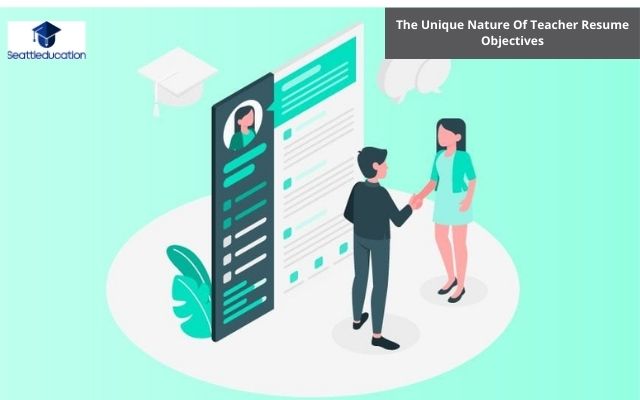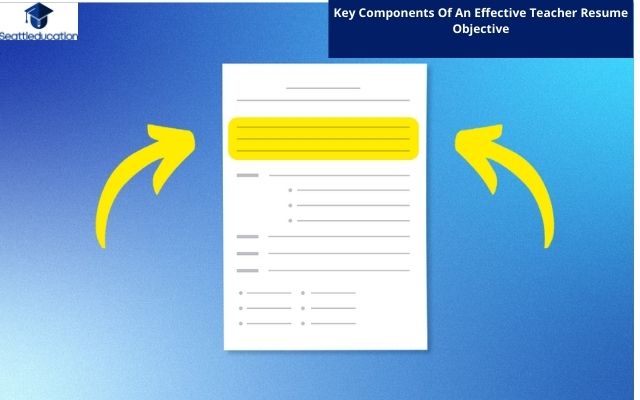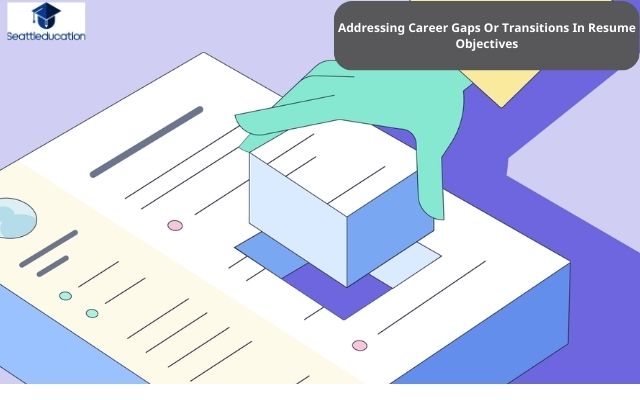Teacher Career Resume Objective: All What You need To Know
Teacher Career Resume Objective: When it comes to planning a career as an educator, it’s important for teachers to have a resume objective that will catch the eye of employers. A well-crafted teacher career resume objective can be the difference between getting hired and being passed up for the job. In this article, we’ll show you how to craft your own teacher career resume objective that will make potential employers take notice and knowing what to include in your teacher career resume is key when writing one.
We’ll provide tips on how to do just that so you can get your foot in the door!
Understanding The Role Of A Resume Objective
When crafting a teacher career resume, it is important to understand the role of an objective statement. This concise section helps hiring managers quickly identify key traits and qualifications that are relevant for the job opening.
By clarifying skills, tailoring your approach, and prioritizing qualifications, you can make sure your resume stands out from other applicants’ and grabs attention in a way that accurately represents who you are as an educator.
The main purpose of a resume objective is to provide employers with a clear understanding of why you believe you would be the best fit for their open position. It should include three or four sentences that summarize exactly what makes you uniquely qualified for this job.
Additionally, it should highlight credentials such as certifications or licenses, any specialized training acquired over the years, knowledge areas, teaching experience (if applicable), and anything else pertinent to the job description.
In order to create an effective objective statement on your teacher career resume, it’s essential to think about how you can showcase your talents while also making yourself stand out from other candidates.
You want to show potential employers why they should choose you by emphasizing your most valuable assets in short but powerful phrases; however, avoid using clichéd language like ‘team player’ or ‘hard worker’, as these won’t necessarily do much to differentiate you from others competing for the same position.
Instead focus on specifics – such as expertise in cooperating learning strategies or proven ability developing lesson plans – that will demonstrate your suitability for the role.
The Unique Nature Of Teacher Resume Objectives
The unique nature of teacher resume objectives is one that should not be overlooked. Teaching is a profession unlike any other, and the goals and expectations for teachers differ greatly compared to those in other industries. As such, an effective teacher resume objective must be tailored specifically to reflect these differences.

For this reason, it’s important to emphasize curriculum skills, communication techniques, and classroom management when crafting a teacher resume objective, as these are all qualities essential for success in the classroom.
Below are five key points every applicant should consider when writing their teacher resume objective:
- Demonstrate mastery of subject matter knowledge relevant to teaching content area
- Show proficiency in developing curricula and lesson plans
- Emphasize ability to engage students through interactive instruction methods
- Highlight track record of successfully managing classrooms efficiently
- Stress commitment to student learning growth and development
It’s also important to demonstrate how past experience has enabled you to positively impact your students’ lives and educational outcomes. This could include showing examples of successful implementation of new programs or initiatives designed with student achievement in mind.
Ultimately, the goal is to illustrate why you’re qualified for the job while emphasizing your dedication towards creating meaningful impacts on future generations.
Key Components Of An Effective Teacher Resume Objective
- Clarity and conciseness is key when writing an effective teacher resume objective; it should be straightforward and easy to understand.
- It’s important to tailor your resume objective to the position you’re applying for; highlight your relevant experience and skills.
- Make sure you’re including specific experience and qualifications that are applicable to the position you are applying for.
- Make sure to keep your resume objective concise and to the point; avoid any unnecessary information that could detract from its effectiveness.
- Highlight your teaching experience and any special skills that make you a good fit for the position.
- Summarize your experience and qualifications in a few sentences so that it is clear and concise.
Clarity And Conciseness
When crafting a resume objective for your teacher career, clarity and conciseness are key. It’s important to ensure that the role you’re applying for is clear from the get-go, as well as using concise language so that it can be read quickly and easily.

Using targeted wording helps show employers that you understand what they’re looking for in an ideal candidate and have tailored your resume accordingly. Pronouns and contractions can also help keep your writing succinct without sacrificing meaning or impact; this way you can make sure the most important information stands out without taking up too much space on your resume.
Ultimately, being strategic with how you phrase things will help demonstrate why you’re the right person for the job while keeping it short and sweet.
Tailoring To The Position
When it comes to tailoring your resume objective for a teaching position, research is key. Taking the time to read and understand the job description will help you identify what skills, qualifications, and experiences are important for the role – allowing you to highlight relevant accomplishments on your own resume.
This also gives you an opportunity to add field-specific keywords that might not be included in your work history or profile summary, which can make all the difference when employers are scanning applications. Highlighting any experience related to teaching is essential as well; this could include classroom volunteer work or tutoring jobs that demonstrate your commitment to education even if they weren’t traditional teacher roles.
Additionally, taking care to clearly convey why you’re passionate about working with students of all ages can show employers what makes you stand out from other applicants.
By doing the necessary applicant research and carefully highlighting both your professional experience and enthusiasm for teaching in your resume objective, you give yourself a better chance at being noticed by potential employers – making sure that yours stands out from the rest!
Relevant Experience And Skills
When it comes to crafting an effective resume objective, highlighting your relevant experience and skills is essential. Experience can range from traditional teacher roles such as classroom instruction or tutoring, to more targeted research in the field of education that you’ve completed. It’s important to demonstrate your level of expertise in order to stand out from other applicants.
Qualifications also play a major role when it comes to setting yourself apart; this includes any special skills related to teaching such as situational adaptability, organizational strategies, and professional development techniques. Showcasing these abilities will give potential employers the confidence that you have what it takes to excel at the position.
Finally, no matter how impressive your experience or qualifications are, if you don’t express enthusiasm for working with students then hiring managers may overlook your application – so make sure you showcase why you’re passionate about teaching!
Teacher Resume Objective Examples By Category
Having a clear objective statement is an important part of crafting an effective teacher resume. It should be concise and specific, explaining why you are the right person for the job. However, there are many different types of teaching positions available, each requiring a unique set of skills and experiences that need to be highlighted in your objective statement.
To make sure your resume stands out from the competition, it’s helpful to keep these categories in mind when writing your objective. For example, elementary school teachers should focus on their emotional intelligence and ability to create a positive learning environment for young students.
High school teachers may want to emphasize their knowledge of current topics or subject areas as well as how they can help students develop critical thinking skills for college readiness. ESL teachers will benefit from highlighting their language abilities and specialized training while substitute teachers might point out their flexibility and willingness to fill in wherever needed.
Preschool teachers must demonstrate creativity and strong communication capabilities alongside appropriate certifications while special education instructors should stress their understanding of IEPs, experience with accommodations for special needs students, and expertise working with diverse learners.
Lastly, teacher assistants should include any administrative duties such as classroom organization, data entry, or filing along with their teaching skills. No matter what type of position you’re seeking, having professional networks and references can also strengthen your application materials. Connecting with other educators through online resources like LinkedIn can provide valuable insight into industry trends and contacts that could lead to additional opportunities down the road.
This shows employers not only do you have the necessary qualifications but that you are willing to go above and beyond expectations to further hone your craft as an educator.
By carefully tailoring your objectives towards particular roles within the field, incorporating relevant keywords throughout your document, and building upon existing relationships, you can effectively highlight all aspects of yourself which makes you stand out among other applicants.
Crafting Resume Objectives For Different Teaching Roles And Settings
The crafting of an effective resume objective for a teaching position is an important part in the job search process. It can be especially tricky to come up with one that best conveys your skills and qualifications, particularly when applying for different roles or settings.
To help you get started, this article will provide mentoring tips, classroom strategies, and subject knowledge considerations to consider when writing a resume objective tailored to various teaching positions. When creating a resume objective for tutoring positions, it’s important to emphasize your ability to assess student needs and develop individualized learning plans accordingly.
Additionally, highlight any experience as either a tutor or teacher alongside any certifications related to instruction or specific academic subjects. Finally, showcase any unique approaches or methods used in past experiences that have proven successful and which could benefit students within the current role.
For curriculum developer roles, demonstrate your understanding of education standards across multiple disciplines while also emphasizing creativity in lesson development. Furthermore, give examples of how you have successfully incorporated technology into existing curricula as well as highlighting outstanding results from previous work in such areas.
Lastly, make sure to draw attention towards relevant professional associations or memberships held by yourself that are applicable to curriculum design and/or implementation processes. In summary, having a strong resume objective for teaching positions can be essential in making sure your candidacy stands out amongst other applicants.
By including pertinent information surrounding mentoring tips, classroom strategies, and subject knowledge expertise – along with personalized touches reflecting the desired environment – potential employers will be better able to comprehend why you would make an ideal addition their team.
Addressing Career Gaps Or Transitions In Resume Objectives
When it comes to bridging career gaps or transitions on a resume objective, it can be difficult to know where to start. Whether you’ve taken time off from teaching for personal reasons, had multiple short-term positions, or simply changed your focus and skill set, there are ways to demonstrate that these experiences have been meaningful in your journey as an educator.

Here’s how you can effectively address career gaps and transitions in your resume objective.
First of all, don’t shy away from the gap! You should explain any job hopping between positions or extended breaks away from work so employers understand why there is a period without employment history.
To do this positively and effectively, emphasize what skills you acquired during this time – such as gaining extra certifications or working with organizations related to education – as well as emphasizing any relevant transferable skills developed throughout the experience.
The key takeaway here is that even if you haven’t worked in a traditional role within teaching for some time, you likely still possess plenty of valuable knowledge and expertise that would be beneficial for the employer. By focusing on what unique benefits you bring through those experiences, you’ll be able to clearly communicate just how qualified you are for the role despite any potential career shifts or disruptions along the way.
Leveraging Social Media And Online Presence In Resume Objectives
In addition to addressing career gaps or transitions in resume objectives, leveraging social media and online presence can be beneficial for job seekers.
As the world of work gets increasingly digital, networking tactics and digital branding are becoming ever more important. Utilizing professional platforms such as LinkedIn, personal websites, and education blogs is a great way to make yourself stand out from other applicants.
Here are five ways you can incorporate your online presence into your resume objective:
- Highlight any awards or recognition you have received through social media outlets;
- Include links to your portfolio so employers can view samples of your work;
- Incorporate keywords related to current industry trends into your profile;
- List certifications that demonstrate expertise in desired areas;
- Make sure all of your profiles showcase a consistent image.
By taking advantage of these tools, you will ensure that your skills are seen by potential employers who may otherwise not find them during the hiring process. Having an impressive online presence not only helps with job searches but also allows recruiters and hiring managers to quickly get insight into what kind of candidate you would be if hired.
Formatting And Placement Of Your Resume Objective
Writing a resume objective is an important part of tailoring your professional career for success. Understanding the correct formatting and placement will help you to make sure that this crucial document stands out amongst other candidates. To get started, here are some key tips on how to craft and effectively position your resume objectives.
First, it’s essential to understand the proper format of a resume objective statement. This should be no longer than two or three sentences in length, summarizing why you believe you are the perfect fit for the job opening. You should also use networking strategies such as LinkedIn and industry-specific trade journals to gain valuable insight into the company culture to inform your statement.
In terms of placement within your overall resume, your profile section should be located at the top just after header information such as name and contact details.
Your objective statement should appear directly underneath this introductory summary so that employers can quickly determine what kind of role you are looking for while they review additional qualifications outlined further down in the document such as education history and work experience.
With these considerations in mind, you’ll have all that’s needed to create a powerful introduction efficiently tailored towards any prospective employer – enabling better interview preparation later on!
Updating And Adapting Your Resume Objective Over Time
Once your resume objective is formatted and placed, it’s important to keep it up-to-date. As you embark on different career paths or search for new jobs, the content of your resume should change accordingly. Updating and adapting your resume objective over time can help ensure that it accurately reflects your skillset and objectives.
Here are three ways to optimize your resume by keeping track of changes in career goals:
- Review Your Objective Regularly: To stay ahead of the curve while job searching, review your objective every few months or whenever a significant shift occurs in your industry or career path. Doing so will allow you to quickly adjust any language that no longer applies to those goals.
- Be Specific About Goals: When crafting an effective resume objective, be as specific as possible about what direction you’re heading toward professionally. This specificity allows employers to easily identify how well suited you are for their position without having them guess at where exactly you want to take your career next.
- Update Your Skill Set Accordingly: In addition to updating the verbiage within your objective statement, make sure that any new skills being acquired are clearly listed in other parts of the document such as job experience sections or even a separate technical skills section if needed. Doing this not only makes the reader more aware of the full range of abilities but also shows commitment towards improving oneself professionally.
By staying mindful of these points when constructing a professional profile, one can rest assured that their desired job role won’t remain elusive due to an outdated objective statement or lack thereof!
It pays off immensely to invest time into revising resumes periodically with fresh words and details tailored specifically around current aspirations – putting forth this extra effort goes a long way in getting recognized by potential employers!
Conclusion
When it comes to creating an effective teacher career resume objective, it’s important to stay up-to-date and make sure your information is accurate. If there are any gaps in my teaching experience, I should explain them in a way that highlights the skills and knowledge gained from other experiences.
The format of my resume objective should be tailored for each job application so as to maximize its impact. Additionally, social media can help me showcase my best qualities and achievements through endorsements and positive reviews. Ultimately, by following these tips and making regular updates, I’m sure to create a strong impression with potential employers.






